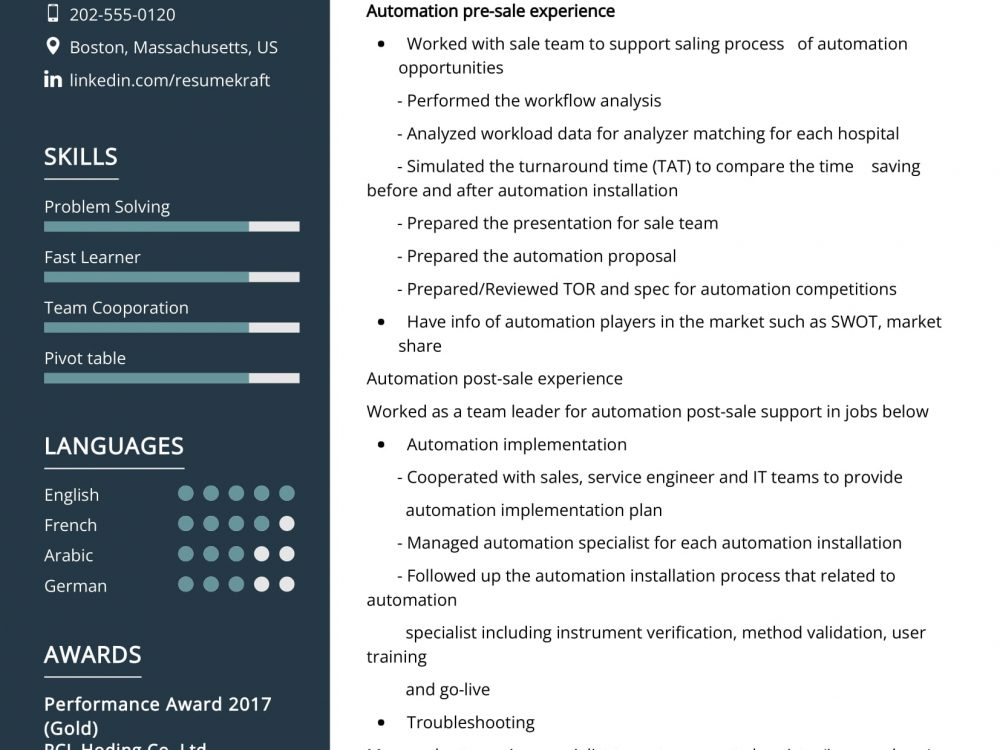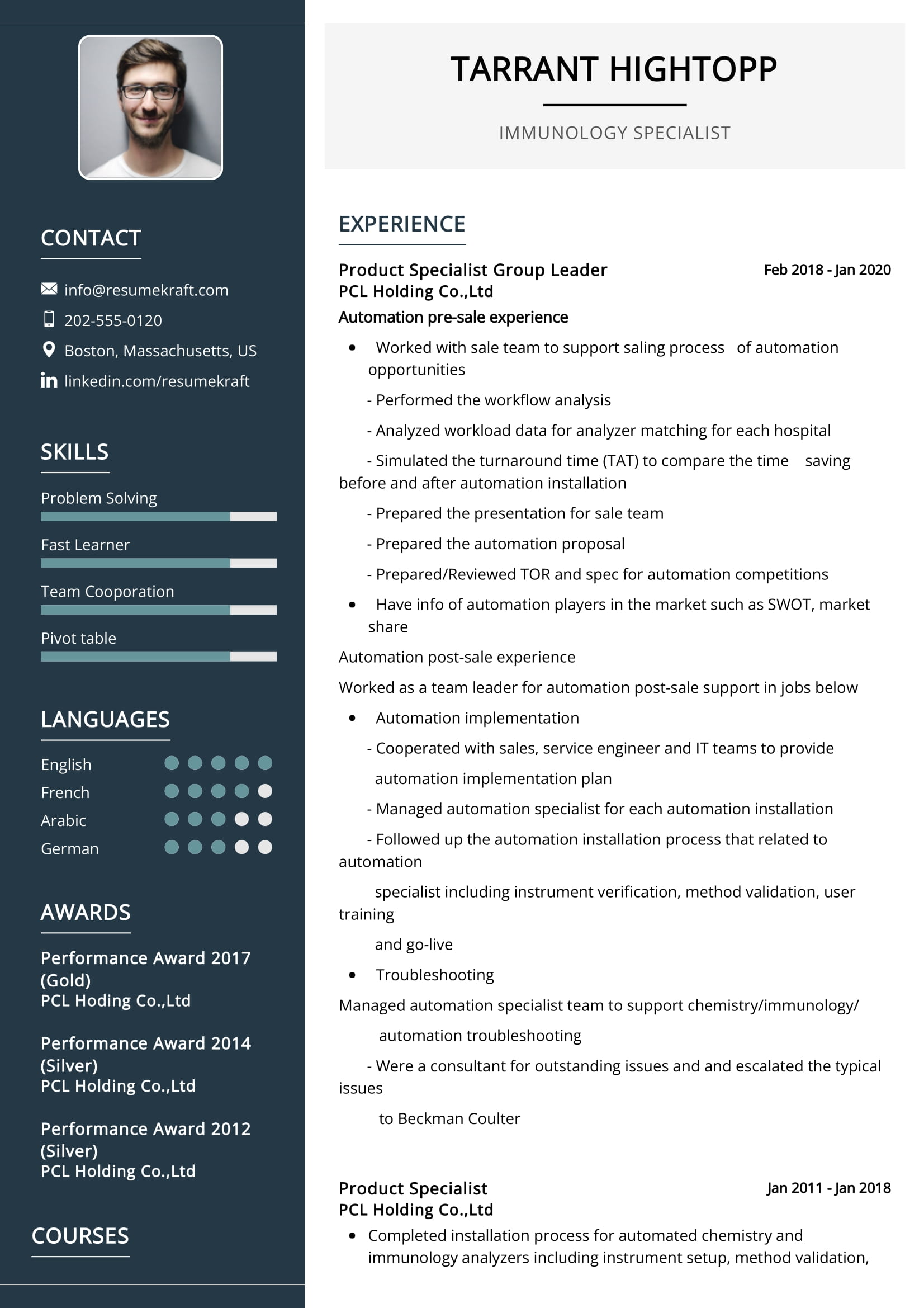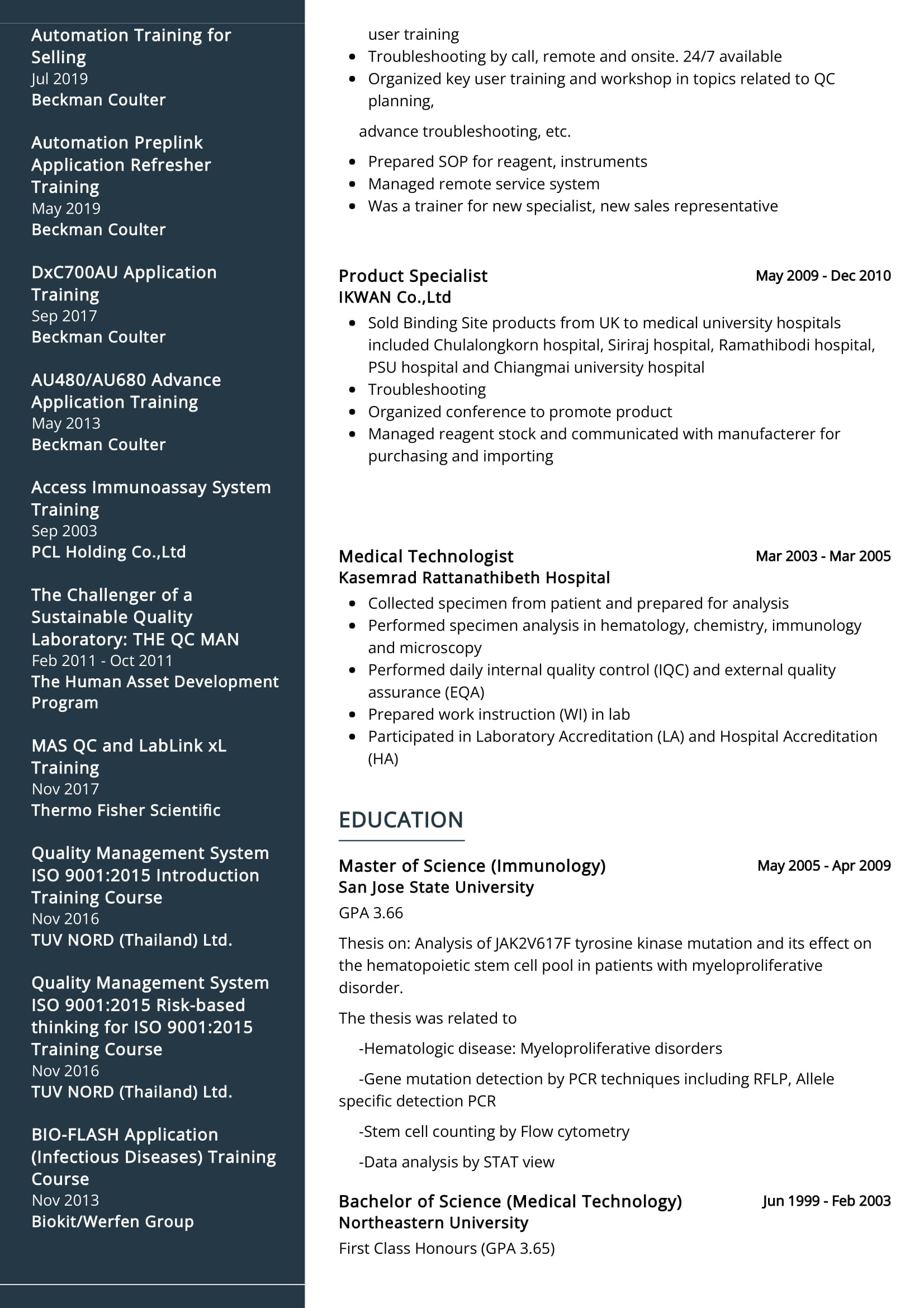What Should Be Included In A Immunology Specialist Resume?
Resume for a position as an Immunology Specialist, it is important to include the necessary skills and qualifications that make you uniquely qualified for the role. These include strong knowledge of laboratory techniques and procedures, as well as expertise in immunology and other related fields. Additionally, you must be able to demonstrate experience interpreting test results and use data to provide diagnoses and treatments.
It is also wise to emphasize any relevant certifications or awards you may have acquired in the course of your career. Any education or specialized training related to the field of immunology should also be prominently featured. Be sure to include any clinical research projects or field work that you have undertaken, as these can help demonstrate your expertise in the field.
When detailing your professional experience, list any roles you have held that relate to immunology. For instance, if you were a lab technician who specialized in immunology-related research, make sure to include this.
When writing a resume for an Immunology Specialist position, it is important to highlight your communication skills. This includes being able to effectively explain complex scientific concepts to non-experts and collaborate with colleagues. Additionally, it is important to demonstrate an understanding of the regulatory frameworks and ethical guidelines related to immunology. Doing so will show potential employers that you understand the importance of proper practices.
What Skills Should I Put On My Resume For Immunology Specialist?
When it comes to crafting a strong resume, skills are one of the most important elements to include. As an immunology specialist, you will have an array of skills and qualifications that are essential to the job. The right combination of qualifications, experience, and skills is necessary to be successful in this role, so it’s essential to know what to put on your resume.
When applying for a position as an immunology specialist, the most important skills to list on your resume include knowledge of the body’s immune system and its role in disease prevention, understanding of laboratory techniques and procedures, and proficiency with relevant laboratory instruments and software. You should also include your ability to work in a fast-paced environment, prioritize tasks and manage time, and work effectively with a team or independently.
In addition to the technical skills listed above, communication is an important skill for an immunology specialist. You should be able to explain complex concepts in a way that non-medical staff can understand. You should also be able to collaborate with a team and present your findings in an organized and concise manner. Management and organizational skills are also beneficial, as immunology specialists often need to manage multiple projects simultaneously and track results and progress.
When writing your resume, include any certification or licensure relevant to the position, such as a Clinical Laboratory Scientist (CLS) license. You should also list any awards, publications, and research projects you have been involved with. Finally, make sure to include any volunteer experience or internships related to immunology.
By listing all of the relevant skills and qualifications on your resume, you can demonstrate to potential employers that you have the necessary experience and expertise to be a successful immunology specialist. Use a clear, organized format to list your educational qualifications, such as any degrees, certifications, or courses related to immunology. You should also list any professional organizations or memberships related to immunology that you have.
What Is The Job Description Of The Immunology Specialist?
Immunology specialists are highly trained and experienced scientists who specialize in the study of the body’s immune system. They are able to diagnose and treat diseases and disorders related to the immune system, such as allergies, autoimmune disorders, HIV, and cancer. Their job description includes performing various laboratory tests, analyzing and interpreting results, and working closely with other healthcare professionals. Immunology specialists must also be familiar with the use of various medical equipment and instruments.
The job of an immunology specialist requires the ability to think critically, use problem-solving skills, and communicate effectively with patients and other health professionals. They must also be able to work with a variety of tools and software programs in order to collect and analyze data. They should be knowledgeable about medical terminology, as well as the latest research and developments in immunology. In order to be successful in this role, immunology specialists must have an excellent understanding of the immune system, its functions, and how it works. They must also have an eye for detail, as they will often be looking at microscopic images and other data to draw conclusions.
Immunology specialists must have a broad understanding of the different types of immunology, such as cellular, molecular, and clinical immunology. They may be required to conduct research in order to stay up to date on the latest developments in the field. In addition, some immunology specialists may be called upon to participate in clinical trials and oversee experiments.
Immunology specialists must have excellent writing skills as well, as they are often required to produce reports and other documents. In addition, they must be capable of presenting their findings to a variety of audiences and must be comfortable in public speaking.
What Is A Good Objective For A Immunology Specialist Resume?
A good objective for a Immunology Specialist resume is to highlight all the relevant qualifications, skills, and experience in the immunology field. This will help employers quickly identify the candidate’s viability for the position. As a specialist in this field, a candidate should focus on their knowledge and skills in the different areas of immunology such as biochemistry, molecular biology, cell biology and genetics. When writing the objective, it is important for the candidate to emphasize their ability to handle complex data, analyze it, and use it to make decisions. The candidate should also include their knowledge of the newest technologies used in immunology research and the ability to work in a team setting. Additionally, mentioning the ability to work with difficult and complex situations is important for the employer to know.
A well-written objective for a Immunology Specialist resume should also include any certifications or awards that the candidate has achieved in the field of immunology. This will demonstrate to the employer that the candidate is highly qualified and has achieved a certain level of skill in this area. Lastly, the candidate should include any special projects that they have worked on in the field of immunology. This will give the employer the assurance that the candidate is capable of taking on challenging tasks and completing them with success.
What Are 5 Responsibilities Of A Immunology Specialist?
.Immunology specialists are responsible for specialized work related to the diagnosis, treatment, and management of diseases related to the immune system. Specifically, they possess a deep understanding of the immune system, its components, and its functions. As a result, immunology specialists are responsible for five important tasks.
- Research and Experiments: Ensuring that the findings can be applied to patient care. This includes conducting clinical trials and collecting data to analyze the effectiveness of treatments and medications. Additionally, they also need to keep up to date with new developments in the field, so they can provide the latest, evidence-based care to their patients.
- Patients with Diagnosis: Treatment, and management of their immune system-related conditions. They assess individual cases and determine the best course of action for each patient, taking into account their medical history, lifestyle, and preferences. They also work with other medical professionals to ensure that the best care is being provided to the patient.
- Education & Counseling Patients: Family members, and care givers regarding the diagnosis, treatment plan, and management of immune system-related conditions. They explain the diagnosis and treatment to the patient and family in a way that is easily understood and provide resources to help them cope with their condition.
- Documenting Patient Information: This includes recording their symptoms, laboratory tests, and treatment progress in a timely and accurate manner .They use this information to track the patient’s progress and make any necessary changes to the treatment plan. Additionally, they coordinate with other healthcare professionals to ensure the patient receives the best possible care.
- Medical Advice & Care to Patients: With a range of immune system-related conditions. This requires them to stay up to date with the latest research and treatments. They provide information to patients and their families to help them understand their conditions and make informed decisions about their care. They also work with other healthcare professionals to coordinate a comprehensive treatment plan, which may include medications, lifestyle changes, physical therapy, and other treatments.
What Are The Career Prospects In The Immunology Specialist?
Immunology is an ever-evolving field in medicine, and the career prospects of an Immunology Specialist are very promising. An Immunology Specialist is a medical doctor who specializes in the diagnosis and treatment of a variety of immune-related disorders. This role is becoming increasingly important as more and more diseases are being linked to the functioning of the immune system.
Immunology Specialists are responsible for diagnosing and treating a variety of conditions related to the immune system, such as allergies, autoimmune diseases, and cancer. They also manage immunosuppressive medications, evaluate patients for organ transplantation, and monitor patients for immune system disorders. This role requires a great deal of knowledge about the immune system and the ability to interpret complex medical information.
Immunology Specialists are in high demand due to the ever-increasing number of individuals suffering from immune-related disorders. As the population ages, the need for these specialists is expected to increase significantly. Additionally, there is a growing demand for Immunology Specialists in the field of personalized medicine, as they play a key role in providing individualized care to patients.
The career prospects for an Immunology Specialist are excellent. With experience, these specialists can become medical directors, research scientists, educators, or administrators. They can also advance to positions such as medical directors in clinical immunology departments, or research directors in academic immunology departments.
In addition to the excellent career prospects, Immunology Specialists also have the potential to make a big impact on the lives of their patients. Through their work, they can help to develop new treatments and improve the quality of life for those afflicted with immune-related disorders. As an Immunology Specialist , one can work in a variety of settings, from pharmaceutical and biotech companies, medical research laboratories, hospitals, public health organizations, and private immunology departments. They can also be employed as consultants, helping to provide advice and guidance to healthcare providers and patients on immunological topics. Immunology Specialists can also be employed as educators, teaching students and the public about the importance of immunology and its applications in healthcare.



